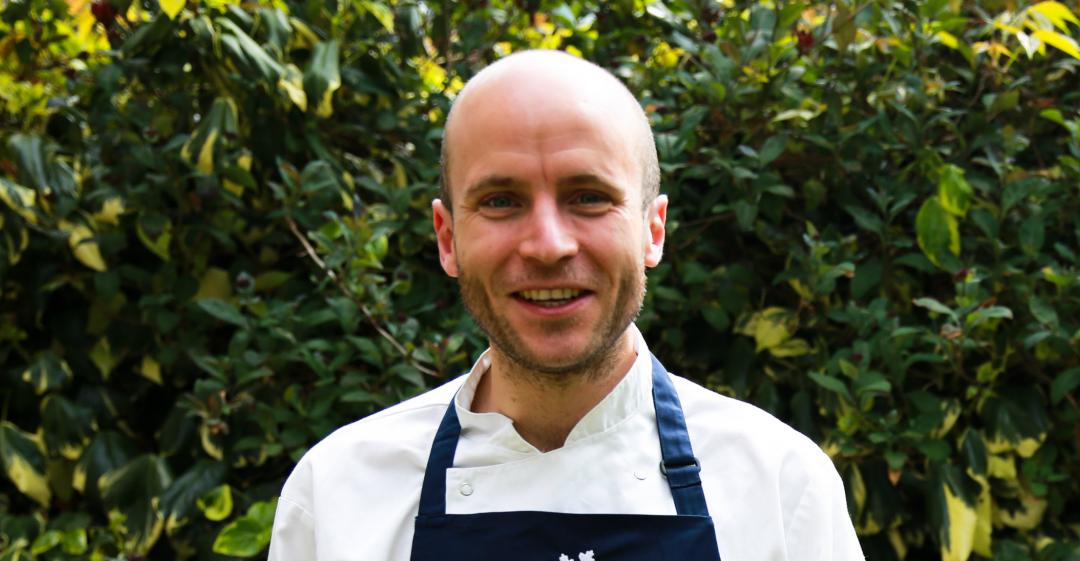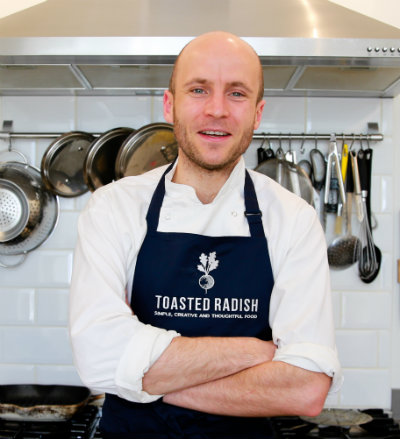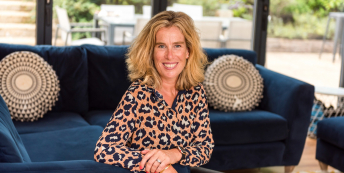“I wanted to be able to look back on my life and think I'd done something I enjoyed, on my own terms.”

What work were you doing previously?
I ran a sales department for a leading estate agency in London.
What are you doing now?
I now run a supper club and bespoke catering business called Toasted Radish.
We focus on thoughtfully sourced food, through both our Edinburgh-based supper club and bespoke catering business. For us, thoughtfully sourced food is seasonal and sustainable. Wherever possible we source within 30 miles of our location, our meat and vegetables are organic, and our fish is selected with sustainability in mind. We believe this ensures the highest possible quality whilst also supporting our local suppliers.
How did you feel about your work before you decided to make a change?
I had reached a plateau within estate agency.
I thrive on moving forward to the next goal and the next challenge. I had built my sales department to be one of the company's most profitable. I could see the limitations from a personal perspective of continuing within the same industry.
I wanted to channel my desire to succeed into something I derived a personal pleasure from, and there was no doubt this would be the food industry.
Why did you change?
I knew that estate agency wasn't something I wanted to stay in for the long haul.
I wanted to be able to look back on my life and think I'd done something I enjoyed, on my own terms.
It's easy to sit back in a career you don't like and say "Lot's of people don't like their jobs" or "I'm earning a good salary", but, as the saying goes "Good is the enemy of great". I wanted my career to feel great.
Are you happy with the change?
Yes.
What do you miss and what don't you miss?
Leaving a 12-year career behind has financial implications but otherwise there isn't much I miss.
I'm surprised how many skills I learnt as an agent that are incredibly useful in my new career.
How did you go about making the shift? And how specifically did you choose your new career?
I have always been immersed in food, whether reading books, cooking or visiting restaurants.
Once I'd decided that I had to make a change sooner rather than later, I approached a local Michelin-starred restaurant – The Kitchin – and asked if I could pop down and do a shift on a Saturday. Much to my surprise they said yes!
After an 18-hour shift, I was hooked.
I decided that I needed to get a solid grounding so that I would be able to make an informed decision about which direction I wanted to take. So, I researched a number of leading cookery schools.
Without a doubt, geography played a big role in where I wanted to train, but I also wanted to find a course that had the same passion for cookery I did. The Edinburgh New Town Cookery School course was well structured and based over an intense six months. Having bills to pay there was a limited amount of time I could have spent in full-time education and I was far more attracted to this course over others that were less intense but spread out over a longer time period.
Once I'd completed the course, I knew I wanted to be in charge of my own business without initially having to cover large overheads like costly restaurant space. With our focus on local, sustainable and organic food we've now built up a loyal customer base and we hope to make a permanent move to a bricks and mortar venue of our own in the next couple of months.
What didn't go well? What 'wrong turns' did you take?
I'm always learning and adapting, but so far I'm happy with the decisions I've made.
How did you handle your finances to make your change possible?
Carefully.
My wife put systems and practices in place to limit the impact on our day-to-day lives. For about a year before making the move, we lived on one salary. This involved us looking at our finances and cutting out unnecessary expenditure.
When it came to the crunch and I started training we didn't find the shift as daunting or arduous as I suspect it would have been. It also meant that we had some extra savings in case of emergencies.
What was the most difficult thing about changing?
The financial implications of the transition.
What help did you get? 
The Edinburgh New Town Cookery School was incredibly helpful in putting me in touch with restaurants and caterers for work experience and jobs, and pointing me in the right direction when the course came to an end.
I was really lucky to be able to undertake two separate stints of work experience at leading Michelin-starred restaurants in Edinburgh, as well as working for a number of leading caterers in the capital.
What have you learnt in the process?
No one is ever stuck in what they do. You can make a positive career change at any point.
What would you advise others to do in the same situation?
Go for it!
To find out more about Roly's business, visit www.toastedradish.com.
Also, find out more about Edinburgh New Town Cookery School in our Retraining Directory.
What lessons could you take from Roly's story to use in your own career change? Let us know in the comments below.



